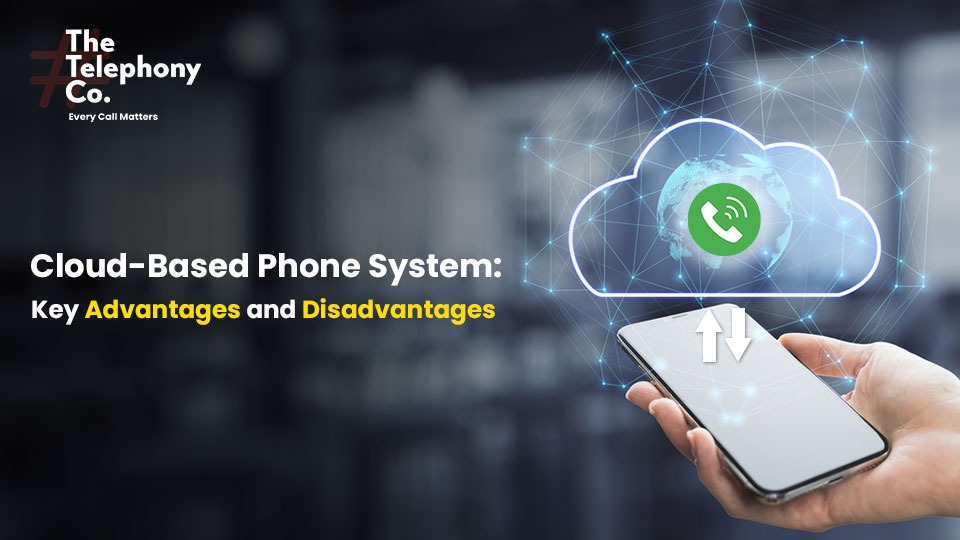A phone system plays a vital role in every business. Today, companies look for communication solutions that are affordable and easy to manage. One popular option is the Cloud-Based Phone System, which runs through the internet.
Whether you own a small business or manage a large company with a big call center, cloud phone systems are a smart choice—especially since traditional phone systems are becoming outdated.
In this article, we’ll explore the main advantages and disadvantages of Cloud-Based Phone System and how they can support your business needs.
What is a Cloud Based Phone System?
A cloud-based phone system connects phone calls using VoIP (Voice over Internet Protocol) technology. Unlike old phone lines that required expensive hardware and a wired network, VoIP phone systems only need a high-speed internet connection. With a cloud phone system, all call routing, data storage, and management take place in secure data centers managed by third-party service providers.
Cloud-based phone systems are designed to support a wide array of communication features, including:
- Voice Calling
- Video Conferencing
- Call Recording
- Voicemail to email
- Interactive voice response (IVR)
- Call Forwarding and AI Call Routing
- Integration with CRM and other Business Software
- Call Tracking
A cloud business phone system helps reduce call costs, supports remote work, and eliminates the need for expensive hardware.
Advantages of Cloud-Based Phone System for Businesses
We’ll now discuss the advantages that make cloud-based phone systems an increasingly preferred solution for both small and large businesses.
Low-Cost Communication System
Compared to traditional phone systems, cloud-based phone systems are much more cost-effective. Wired phone systems involve a significant upfront investment in hardware, cabling, maintenance, and installation.
Wire phone systems, businesses must pay per line and are charged separately for local, domestic, and international calls. In contrast, VoIP systems follow a pay-as-you-use model, and both local and international call rates are significantly lower with advance features.
In traditional phone systems, businesses often have to pay extra for every additional feature. Whether it’s call routing, IVR, or monitoring tools—each upgrade usually comes with added costs.
With VoIP-based cloud phone systems, advanced features like AI-powered call routing, auto attendants, IVR menus, call monitoring, and call logs are included by default. Plus, you can get free local numbers, virtual phone numbers, and even toll-free numbers at no additional charge.
Improved Reliability and Uptime
cloud-based phone systems are their high reliability and consistent uptime. Unlike traditional phone systems that depend on physical hardware and can be affected by power outages, wiring issues, or equipment failures, cloud phone systems are hosted in secure, redundant data centers.
These systems are built with multiple backup servers and failover technology to ensure continuous operation—even if one data center server goes down or fails. This means your business remains unaffected and continues to operate smoothly.
Businesses can access their backup systems and work from anywhere, ensuring customers never face service interruptions or issues.
Simple Setup and Seamless Management
Traditional phone systems often take a lot of time to set up. They require on-site hardware, technical teams, new ports, and complex wiring. Even assigning a new number to an employee can be a time-consuming process.
In contrast, cloud-based phone systems are quick and easy to manage. Everything can be controlled through a simple web dashboard or mobile app. You can add new users, add new number set up call routing, IVR, voicemail, and view call analytics—all in just a few clicks.
Whether you’re a small startup or a large enterprise, cloud VoIP systems offer reliable, scalable, and easy-to-use communication solutions.
VoIP Call Features that Work Anytime
While traditional phone systems offer only basic calling features, cloud-based phone systems come equipped with advanced and AI-powered capabilities. You can integrate CRM tools, monitor call quality, and enable smart features like call whispering, call barging, and AI-driven sentiment analysis.
- Auto Attendants
- Multi-level IVR
- AI Call Routing
- Automatic Call Recorder
- Call Log History & Monitor
- Call Analytics and Reports
- Voicemail-to-text/email
- Advance Call Monitoring
- CRM integration (Salesforce, HubSpot, etc.)
- Instant Messaging and Team Collaboration
- Global Number (Local, toll free, virtual phone number 40+ Country)
These features help businesses improve customer experience, streamline operations, and make data-driven decisions.
Perfect for Flexible Work Options
Working a few days from the office and the rest from home has become the new normal for many businesses today. Whether you’re in the office or working remotely, a cloud-based business phone system fully supports both remote and hybrid work environments.
With a single VoIP phone number, you can stay connected from anywhere—be it your home, office, or even while traveling. No need for separate devices or complex setups.
Team members can easily use their business phone number on personal devices through a VoIP mobile app. This allows them to make and receive calls, check voicemails, transfer calls, and stay in touch with customers and colleagues—without being tied to a desk.
Minimal Maintenance
For many companies today, using traditional wired phone systems has become more of a headache than a solution. Maintaining these systems is not only expensive but also requires a dedicated and costly IT hardware team.
Businesses need a range of physical equipment—such as wires, cabling, and PBX systems—as well as regular servicing and technical support. These setups demand dedicated space and can lead to significant downtime during repairs or upgrades. As a result, traditional phone systems are both costly and difficult to manage.
On the other hand, cloud phone systems offer a smarter, more efficient alternative.
Cloud-based systems are automatically updated by the service provider. Software upgrades, security patches, and performance improvements are rolled out in real time—without any disruption to your operations. This ensures your communication system is always running on the latest version, without requiring any manual effort.
There’s no need for ongoing hardware maintenance or repairs. If a device stops working, employees can easily switch to another internet-enabled device—like a smartphone, tablet, or laptop—and continue using the phone system without any interruption.
With cloud phone systems, businesses save time, reduce IT costs, and gain the flexibility needed to support a modern, mobile workforce.
One Platform for Multiple Tools
Old phone systems were limited to basic calling features and lacked the flexibility modern businesses need. With advancing technology, business phone systems have also evolved. Today, cloud-based phone systems powered by VoIP services offer a smarter way to communicate.
These systems go beyond just making and receiving calls—they provide a complete Unified Communication solution tailored to your business needs.
With a single, easy-to-use platform, businesses can access:
- Voice and video calling
- Group meetings and video conferencing
- VoIP phone services
- Instant messaging and team chat
- Email and voicemail integration
- File sharing and real-time collaboration
- Mobile access from anywhere
All these features work together to keep your team connected and productive.
Global Reach with Local Presence
Cloud-based phone systems offer global reach with a strong local presence by enabling businesses to use local, virtual and international toll-free phone numbers without physical offices. This builds customer trust and improves call response rates.
- Instantly get global phone numbers in 40+ countries or regions
- Make and receive international calls at lower rates
- Route calls globally through a unified platform
Businesses can route calls to teams anywhere, support multiple time zones, and reduce international calling costs. Whether you’re a startup or an enterprise, a cloud phone system helps you expand globally while maintaining personalized, local-level communication with customers across regions.
Disadvantages of Cloud Based Phone System for Modern Business Communication
Cloud-based phone systems offer many modern features, but like any technology, they have some downsides too. It’s important for businesses to understand these challenges before switching from traditional systems. Below are some common disadvantages of cloud phone systems:
Dependence on High-Speed Internet Connection
Cloud phones use the internet (VoIP) to make and receive calls. If your internet is slow, unstable, or stops working, your business phone system will not work properly. This can lead to dropped calls, delay in voice (lag), or unclear audio.
So, if your internet connection isn’t strong, you may face regular problems. Businesses in remote or rural areas may need to upgrade their internet first.
Power and Network Outages Can Stop Service
Unlike traditional landlines that work even during power cuts, cloud phone systems need both power and internet. If there is a power outage or network failure, the entire phone system may stop working.
To avoid this, businesses need backup systems like power banks, UPS, or mobile data to stay connected during outages.
Emergency Calls May Not Be Accurate
Traditional phones can automatically send your location to emergency services (like 911). But with cloud phones system, especially if you’re using a mobile app or working from home, your exact location might not be shared correctly.
This can create issues during emergencies if the caller’s location is not clear to responders. The Telephony co best cloud phone system providers offer E911 support, but it’s not always as reliable as landlines.
Little Security Risks
Cloud phone systems use the internet, so they can be at risk of cyberattacks if not properly protected. Hackers may try to listen to calls, steal information, or use your system to make fake international calls.
Businesses must ensure they use strong passwords, encryption, firewalls, and other security settings. Choosing a reliable VoIP provider with strong security policies is very important.
Call Quality Issues in Low-Bandwidth Situations
If your internet is being used for video streaming, large downloads, or many devices at the same time, the call quality on your cloud phone may go down. You may hear delays, echoes, or choppy sound.
To avoid this, it’s a good idea to set up Quality of Service (QoS) on your network and ensure enough bandwidth is available for voice calls.
You Rely on the Provider for Support and Updates
With cloud phones, the service provider handles software updates, maintenance, and technical support. If the provider faces a problem, your VoIP phone system could be affected. You can’t fix these issues yourself, and you must wait for the provider to solve them.
That’s why it’s important to choose a best cloud phone system provider that offers strong customer support and high system uptime.
Important Tips to Know Before Moving Your Business Phone System to the Cloud
Switching to a cloud-based phone system is a smart move for modern businesses, but proper planning is key to a smooth transition. Before you migrate, here are some important tips to consider:
Check Your Internet Connection
A cloud phone system runs entirely over the internet. Make sure your connection is fast, stable, and reliable to handle high-quality voice calls without lag or dropouts.
Understand Your Business Needs
List out your must-have features such as call forwarding, Call routing, IVR, Call monitoring, SIP trunk, voicemail-to-email, or mobile access. Choose a provider that offers advance AI features tailored to your business size and goals.
Choose a Trusted Provider
Select a cloud telephony provider with a strong reputation in the telecom market for uptime, support, and data security. Look for 24/7 support, secure servers, and positive reviews.
Understand Pricing & Contracts
Check if the provider that offers flexible cloud phone pricing plans. Know what’s included, such as toll-free and local numbers, call minutes, or AI chatbot & voice support, and avoid hidden charges.
Test Before Full Deployment
Before switching your business to the cloud, ask the provider some important questions and request a demo or trial of the service. Make sure to schedule a meeting with the provider before deployment to fully understand the service they offer.
Final Thought
A cloud phone system provides advanced features for your business that traditional phone systems cannot offer. In today’s fast-paced environment, it delivers the modern solutions growing businesses truly need.
For most modern businesses, the benefits of cloud phone systems far outweigh the drawbacks—making them a smart, future-ready investment in unified communication.

